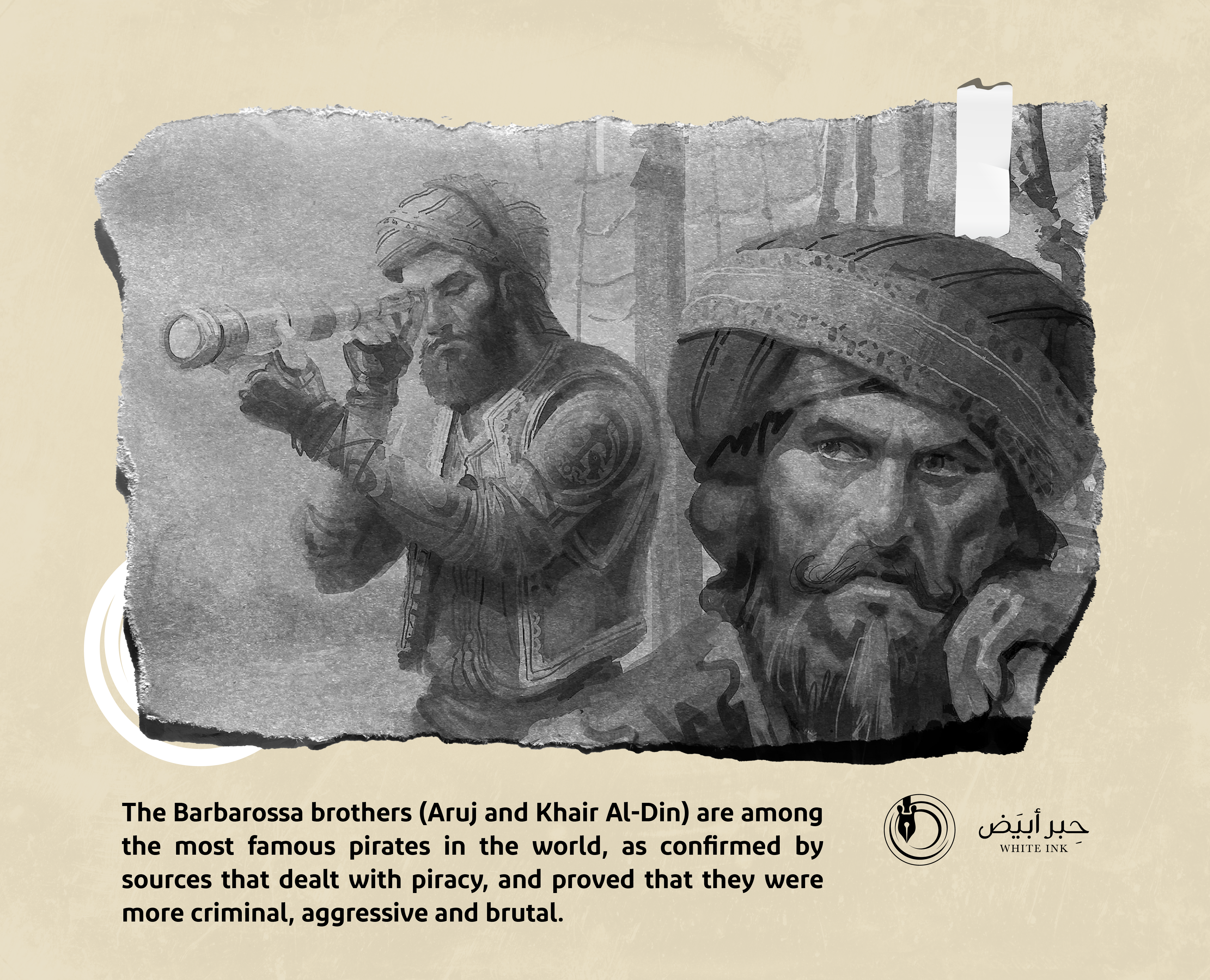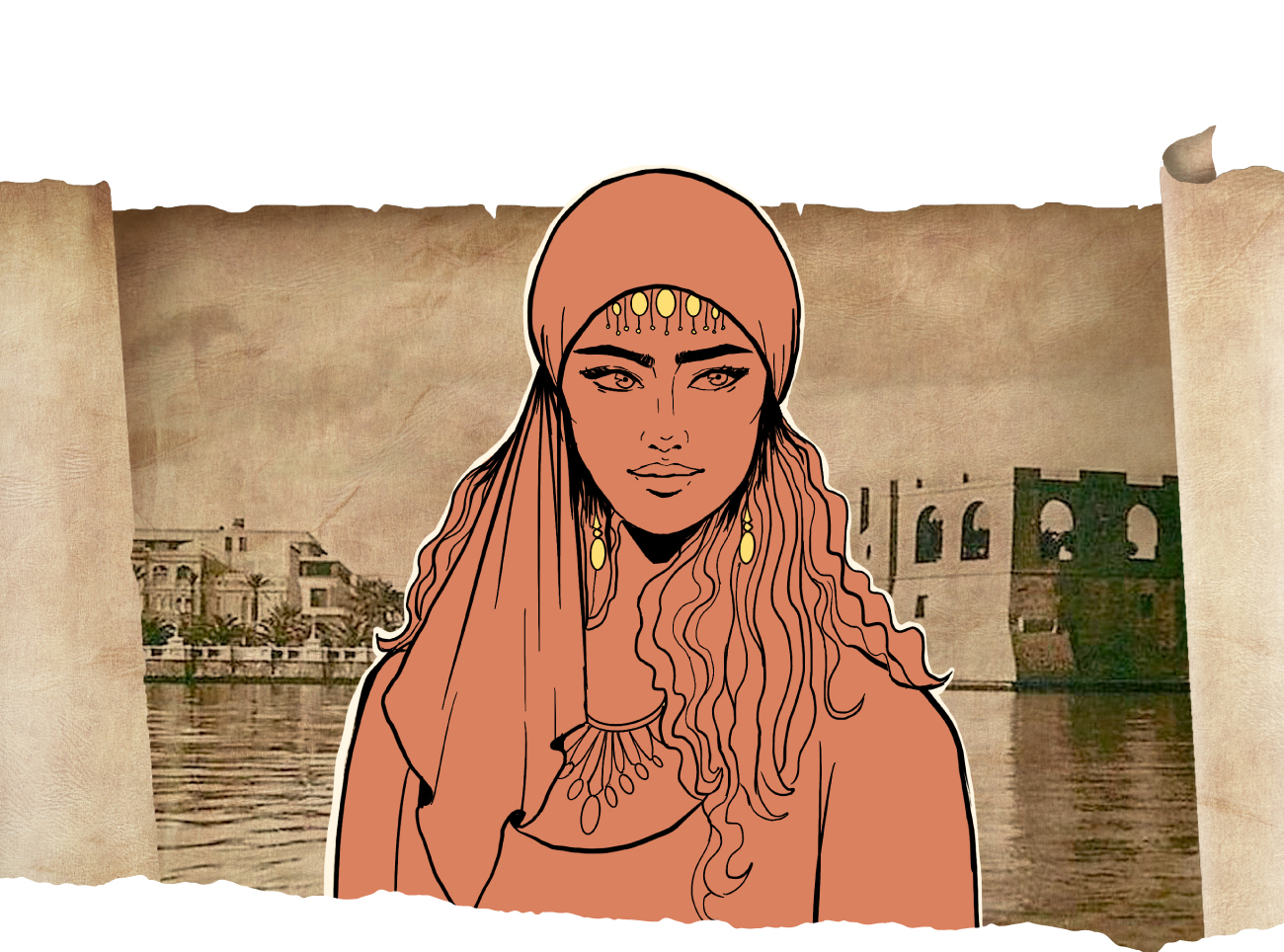
The Algerian graves’ Sultana
Zafira...who chose to die so that her honor would not be desecrated by the Turkish pirates.
The Ottomans entered Algeria under the pretext of saving the people from the Spanish invasions. The Algerians cheered, welcomed them into their homes, brought them into their cities, and sang for them in the streets. As soon as they occupied the place, they wreaked havoc in it and treated the indigenous population as slaves and placed them in a lower class than the Turkish race, as thieves and bandits usually do when they take control.
When the Sultan of Algeria, Selim Al-Toumi, sought the help of the Ottomans, they sent him the famous sea pirates, the brothers Aruj and Khair Al-Din Barbarossa, who were famous thieves and pirates. The Turkish sultans in Istanbul did not intend to send their regular military, but rather they sent pirates. If they were victorious, the Ottomans would receive praise and spoils, and if they were defeated, they would tell the Spaniards and Europeans with whom they had distinguished relations that they were not involved, but rather they were pirates and thieves.
Historical sources confirm that the two brothers, Aruj and Khair Al-Din, were not former workers of the Ottoman Empire, but rather two pirates who roamed the sea for looting and plunder. Historians have different opinions about the beginning of the alliance between the Ottomans and the two brothers, Aruj and Khair Al-Din. Some of them mention that Selim I sent them to the African coast in response to a request for help from the people of North Africa instead of his Ottoman army, fearing for his relations with the French and Spaniards.
Some historians mention that the alliance between the two sides was in (1513) following the capture of the port of Jijel by Aruj and Khair Al-Din. They say that the brothers sent to Selim I a group of valuables that they stole after seizing the city. He accepted it and responded to their gift by sending fourteen warships equipped with soldiers, to complete the conquest of Algeria, and the response from the Ottoman Sultan reflected his desire to continue the activity of the pirates in Algeria in the name of Turks.
Khair Al-Din Barbarossa was appointed as a general prince of the city of Algiers and a representative of the Ottoman Sultan; thus, Algeria became under the oppression and occupation of the Turks.
As for Sultan Selim Al-Toumi and the Algerians, they received the pirates with their Arab morals as representatives of the Ottomans, but Aruj Pasha and the rest of the pirates dealt with the population with despotism and chaos, which led to the anger of the population at the actions of the Turks who were treating the Algerians in a rude manner. Here Sultan Selim Al-Tumi tried to correct his mistake in summoning the Turks to his garden, his house and his sultanate, but it was too late, as Aruj went to his house and killed him in the bathroom while he was preparing for the noon prayer. After that, Aruj came out on the public, declaring himself the sultan of Algeria.
This is the recurrent cruelty in every country occupied by the Ottomans. As for their unified policy, it is cunning, division and arousing sedition between the members of the same family, and between tribes and families. They adopted the policy of “Divide and rule” in addition to ethnic cleansing and Turkification.
Aruj was not satisfied with killing Selim Al-Toumi and seizing his kingdom, but he also did not possess any right morals and tried to forcibly marry Princess Zafira, the wife of the treacherously murdered Sultan, while she was in her waiting period (The ‘iddah period) after her husband’s death. Princess Zafira represented Algerian and Arab women in the best way with her steadfastness and her deterrence to the tyrannical pirate, Aruj, who seized her kingdom.
The shameful thing in Princess Zafira’s story is that the two brothers, Aruj and Khair Al-Din Barbarossa, competed to kidnap and enslave the princess after they killed the legitimate Algerian sultan. They did not possess any religious or moral values.
The Algerian researcher Kamel Al-Shirazi says in his important publication on the Ottoman era in Algeria: “The most famous crime committed by the two Turkish leaders, Aruj and Khair Al-Din Barbarossa, five centuries ago in Algeria, is still obscured. The two sailor brothers murdered the last sultan of Algeria, Selim Al-Toumi, and then each of them sought to forcibly marry Princess Zafira, who preferred suicide rather than submitting to the desires of those who killed her husband”.
Despite the Turks’ attempt to praise their presence in Algeria between (1516-1830), history always reveals the truth, despite the attempts to obscure it. Although some historians ignore the crimes of the Turkish occupation of Algeria, the sources reveal many of the crimes committed by the Turks, the most criminal of which was committed with Princess Zafira.
After Aruj killed Al-Toumi, he tried several times to win the heart of Princess Zafira, but she remained loyal to her treacherously murdered husband, and refused to betray him. The pirate Aruj broke into her bedroom and tried to assault her and desecrate her honor. That night, the Arab princess used a dagger she had hidden for fear of Aruj and his brother. She resisted him preferring death to betrayal and escaping from the desecration of her honor by the Greek-Turkish thief that Istanbul had sent to be its pirate and delegate in Algeria. Therefore, as soon as she resisted, he betrayed her and he killed her with the sword. There are other historical accounts that say that she killed herself with the dagger that she had hidden in her bedroom because she expected betrayal from Aruj and his brother.
The Barbarossa brothers betrayed Sultan Selim Al-Toumi and killed him after he allowed them to enter Algeria under the pretext of confronting the Spaniards with him.

The researcher Aisha Hamy points out that Princess Zafira, who lived in the period (1489-1516), kept repeating: “I am a lioness, a majestic princess in the yard of lions. I will keep the promise and I will take up the sword to defend my honor. My blood will shed on my land to be a redemption for the flowers”.
This was after she was exposed to vile attempts by the two thieves, who had betrayed her husband, to bargain for her honor. In particular, Aruj sought to persuade her to marry him in exchange for many temptations, but the girl of Algeria responded to him with those words mentioned by the researcher Aisha Hamy: “I am a woman of pure blood. Life taught me the meaning of honor and patriotism”.
The Algerians have immortalized through their folklore the heroism of Princess Zafira in their poems. The great Algerian folk poet, Muhammad Ibn Musayyib, showed the sacrifice of Princess Zafira in his poem “The graves’ Sultana”:



- Yatsik Makhovsky, The History of Piracy in the World, translated by: Anwar Muhammad (Cairo: The Egyptian General Book Organization, 2008).
- Hassan Kachroud, Salaries of Soldiers and Employees and Their Social and Economic Conditions in Ottoman Algeria, Mentouri University (2007).
- Walid Fekri, The Ottoman Crime (Cairo: Al-Rewaq Publishing and Distribution, 2021).
- Memoirs of Khair Al-Din Barbarossa, translated by: Mohamed Darrag (Algeria: Al-Asala Company, 2010).
- Saleh Abbad, Algeria during the Turkish rule 1514-1830 (Algeria: Editions Houma, 2012).
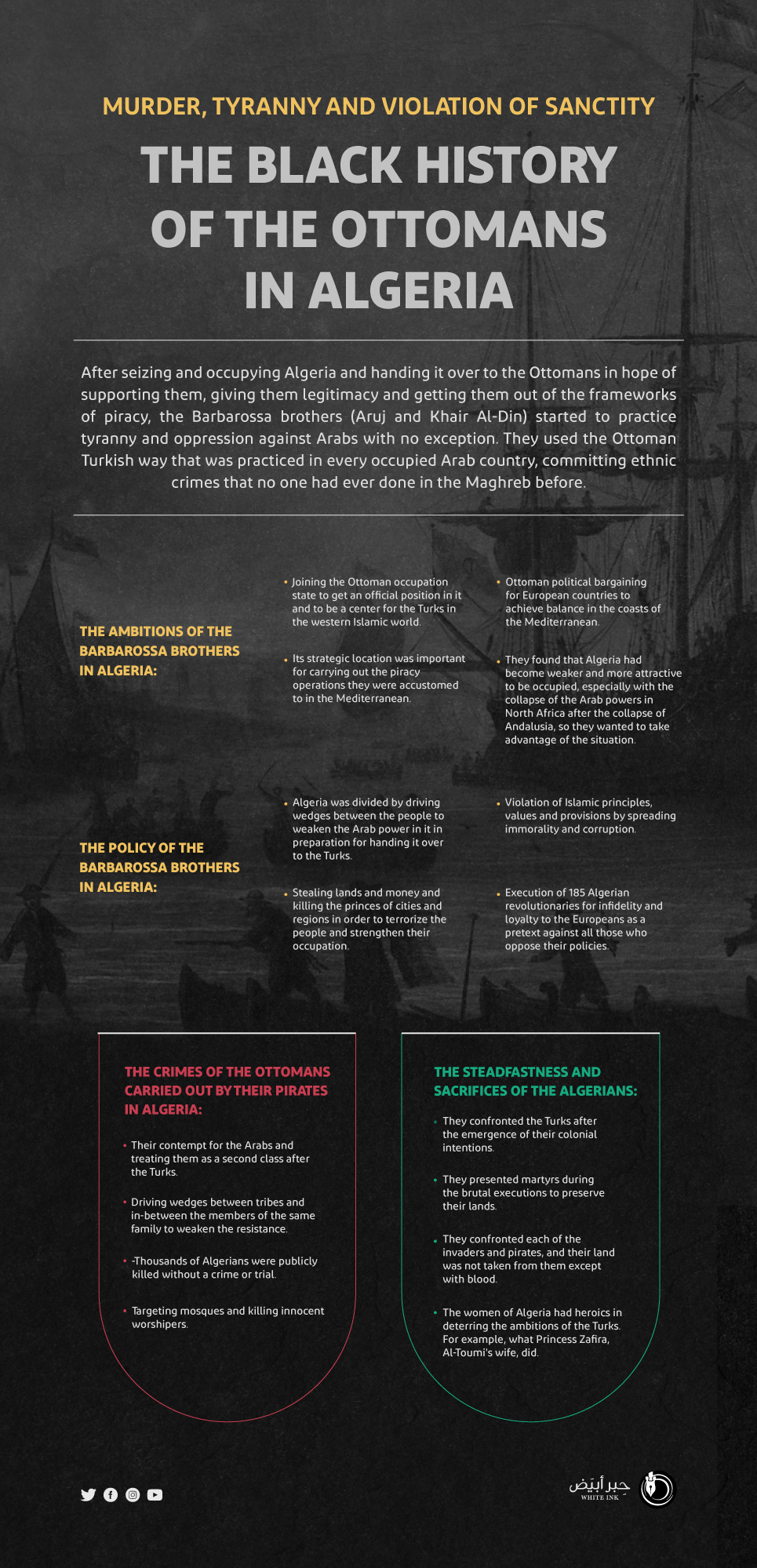
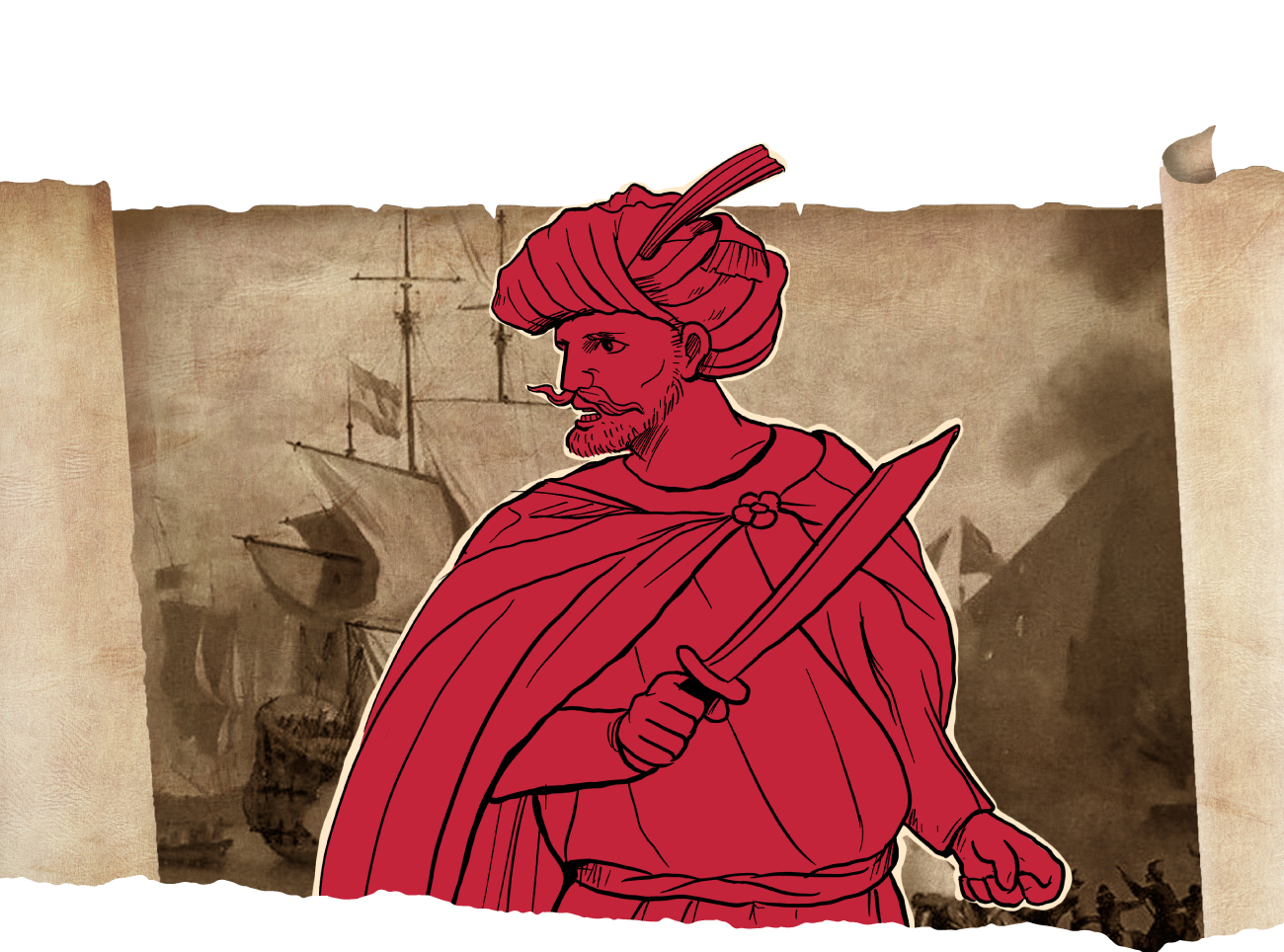
Under the pretext of alliance with the Europeans
How did the Ottomans justify their ambitions in Algeria against the local authority?
Studying the history of the Turkish occupation of North Africa and the compilation of historical documents and material evidence confirm that subjecting the region to the rule of the Ottoman Sublime Porte caused by a group of subjective and objective factors that all combined to make Algeria and the rest of the Emirates a victim of the worst colonial era to which the region was subjected.
On the other hand, the arrangement of the brothers, Aruj and Khair Al-Din Barbarossa, was contrary to what the inhabitants of Algiers wished. The pirates considered that the subjugation of the city was only a stage in their way to establish a state for themselves in the west of the Islamic world, and that Algeria represented a political base for expanding the borders of the new state, as well as being a strategic location for continuing piracy operations and disturbing the “enemy” on the other side of the Mediterranean.
The Barbarossa brothers changed the tactics of expansion after they realized that subjugating Algeria would be less costly than an adventure with unsafe consequences for Egypt, as it was the first target in Aruj Barbarossa’s plans. This is what the Algerian historian Mubarak El-Mili referred to, by saying: “Aruj was in the city of Jijel when the appeal of the inhabitants of Algeria reached him. At that time, he changed his thinking about the occupation of Egypt and saw that the opportunity arose and that the conditions were created to establish a new rule in Algeria that would be purely for him and his brother”.
As soon as they took control of Algeria and occupied it, the Ottomans used their piracy with the people, where they caused murder and brutality without guilt.

In this regard, after Aruj declared himself sultan over Algeria instead of its former ruler, he began implementing his new plan. The beginning was from the Emirate of Tennes, where the accusation was ready, which is the support of the Spanish infidels against the Muslims, and as a result of that, Aruj prepared an army of one thousand five hundred soldiers to confront the Sheikh of Tennes.
Since the goal was to occupy the largest number of areas, Aruj succeeded in seizing Medea and Miliana, while Khair Al-Din succeeded in occupying Dellys and its surroundings. With the arrival of Aruj’s army to the outskirts of the city of Blida, he clashed with the Sheikh of Tennes’s armies, and a bloody war broke out between the two sides that ended with the victory of Aruj. He finished off the fugitives from Tennes’s army until he entered it after taking the lives of thousands of Muslims who would not have imagined being ruled by a Turkish pirate of unknown origin, lineage, religion and affiliation.
Aruj’s seizure of Tennes included extremist criminal manifestations, and the pirate did not have the morals of Muslims, but rather killed their sheikh and his companions and mutilated their dead bodies without judgment or testimony. This bloody scene is narrated by Khair Al-Din Barbarossa in his memoirs, saying: “Then he immediately waved to the executioner to cut off the neck of the traitor (The prince of Tennes), after which he summoned a number of Arab leaders and ordered their necks to be cut off as well”.
The occupation of Tennes was a stop in a bloody path that the region had suffered from for more than three centuries. It was sufficient to stop the clocks of time and to return the Muslims of the Central Maghreb to centuries of backwardness, civilizational ruin, and cultural bankruptcy under a dictatorial rule that glorifies its race and the non-Arabs, despise the indigenous population and waste blood and honor.
After Tennes, it was the turn of Tlemcen, which Aruj considered the origin of strife. It is the matter that requires asking an obvious question: How can a region be described as the origin of strife when it was never under the rule of the Turks and has maintained complete independence from the rest of the dynasties and the Emirates? This political reality is testified by Barbarossa himself in his saying: “It was a large city located in the far west of Algeria, on the borders of Fez, as it was ruled by a ruling family for a long time”.
The Turkish pirates shared the lands of Tlemcen and distributed it among their leaders.

Tlemcen collapsed, like the rest of the independent Emirates, and its residents came out strangely looking at the Turks who had not seen or known them before, especially Aruj. They welcomed them in a cheerful way. However, the feelings of joy at the entry of the Turks turned into pain and suffering, as Aruj began to seize the property of Banu Zayan’s King and then proceeded to seize a lot of money and lands in Tlemcen and began spending everything on the army and giving gifts to his followers.
These were some of the manifestations of the occupation and humiliation practiced by the Turkish pirates against the residents of the region, and it is the same treatment of the usurping occupier who starts with giving promises and oaths and ends with breaking promises and severing necks.


- Memoirs of Khair Al-Din Barbarossa, translated by: Mohamed Darrag (Algeria: Al-Asala Company, 2010).
- Fray Diego Haido, History of the Kings of Algeria, translated by: Abdulaziz Al-A’la (Algeria: Dar Elhouda, 2013).
- Mubarak El-Mili, Ancient and Modern History of Algeria (Algeria: The National Book Foundation).
- Saleh Abbad, Algeria during the Turkish rule 1514-1830 (Algeria: Editions Houma, 2012).
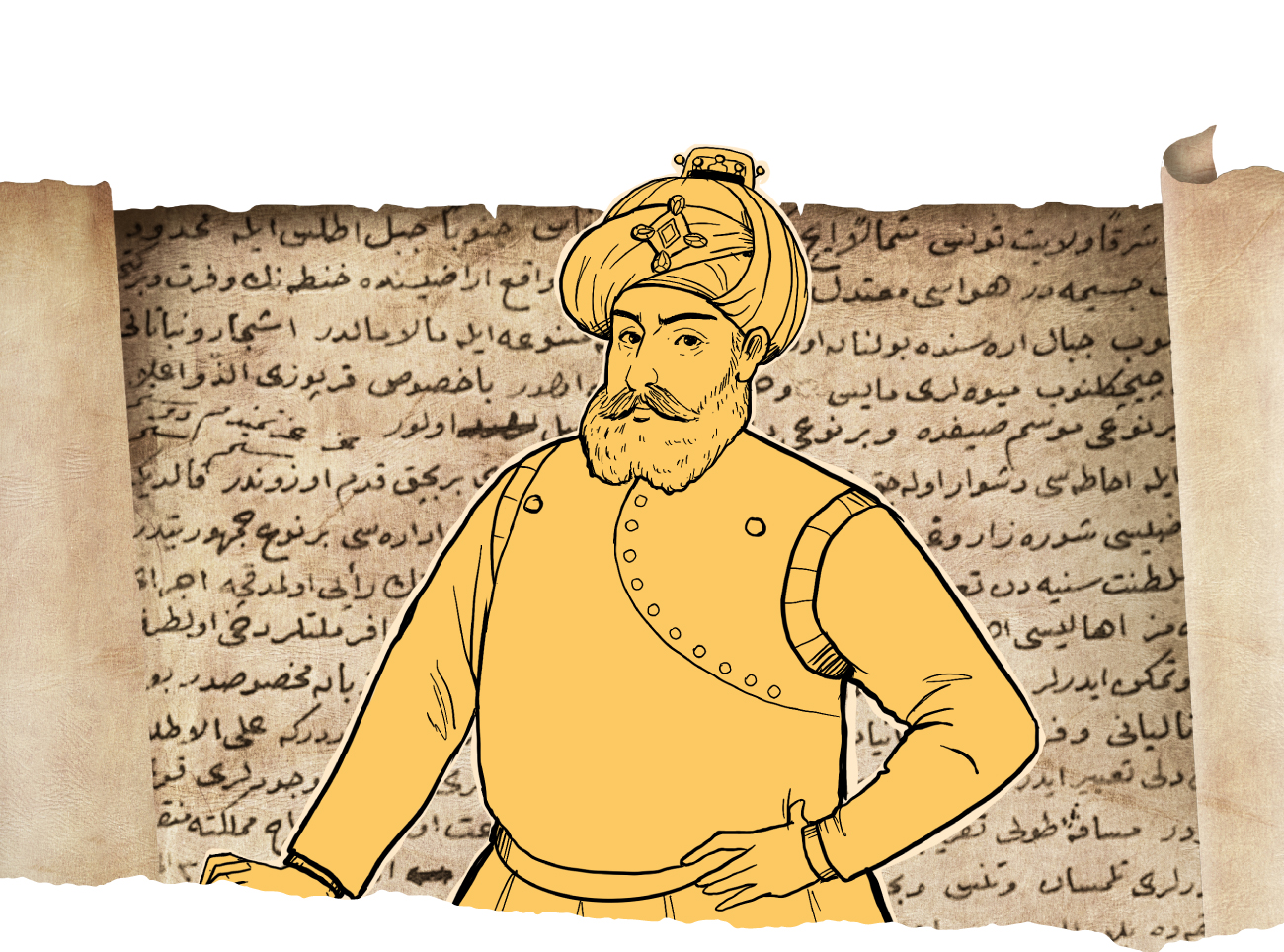
They despised Arabs and allowed the Turks to ravage without rendering account
The Racist crimes of the Ottomans in Algeria
The goal of the Ottoman Turks in Algeria was not of perspicuous nature, but was to occupy the largest Arab spot and drain its resources, and the Ottomans aimed to make Algeria a base to extend their influence to control the west of Tripoli and Tunisia? Here a question arises: Did the Ottomans preserve the Arabism and Islam of the North African population, as mentioned by some modern historians? Or is it an attempt to find a foothold for them in the region by taking advantage of the conditions and exploiting them for their colonial interests?
Narrating the historical stage clearly without emotional interpretations and a tendency engraved with praise, compliment and sanctity in an unacceptable way for the history of the Turks in North Africa, puts us before a fact that reveals the details of the Ottoman guilt by occupying Algeria. It is absurd that some Arab historians have reiterated what was planned and written by the Ottomans about themselves, thus they almost lost the evident truth and the existence of the other opinion in these Ottoman ages that was full of oppression and darkness against the Arabs.
Some of the Arab historians fell into the trap of the Ottomans, who worked to falsify history and add Sanctity to their deeds.

Some of the pirates of the Mediterranean worked for their own account, and the other for the benefit of the Ottomans, and their goal was the spoils and loot, including the brothers Aruj and Khair al-Din Barbarossa, who were considered the most prominent sea pirates in the sixteenth century, and they were the main reason why parts of the north Africa such as Tunisia and Algeria, were occupied. Aruj was able to establish a military government under his leadership that was joined by many tribes, and the inhabitants of the cities, through which Algeria was seized and occupied, and indeed paved the way for the arrival of the Turks to North Africa.
After the chapter Aruj was closed with his death, and his brother Khair al-Din took over, he created some organizations through which the inhabitants of Algeria were subdued to Turkish rule, then he divided the country in two. The eastern section, which includes the mountainous areas inhabited by tribes and extends to the Tunisian border, and the western section extends from the city of Algiers to the borders of the state of Bani Zayan. As a result, he became the strong man who controls it, and he established an administration to study laws and regulations, and all its orders.
Despite Khair al-Din’s claim to confront European countries, his personal ambitions for rule and power were the most prominent reason of his rule in Algeria. He narrates about this in his memoirs by saying: “It has become necessary to establish a new state in our exile.” His private memoirs showed his excessive love and his absolute loyalty to the Ottoman Sultan, at the expense of the people of Algeria. In this context and on the contrary, he visibly showed his hatred for the Arabs. In his dealings with the Algerians revolting against him, he used terms of abhorrent racism, such as his saying: “son of bitch, the Bedouin, the Arabs,” and other descriptions that we are accustomed to reading in the Ottoman documents against their Arab opponents.
While some Arab historians are influenced by emotionally defending the two brothers, and consider the comprehensive conscious view of the historical scene and event, of being a kind of distortion of facts. While the facts are considered completely, not by excluding part of such facts according to desires, and turning a blind eye to what goes against his desires.
It is noticeable that Khair al-Din Barbarossa was cruel against the Arabs in many occasions. The texts of his memoirs confirm this. He says: “And at the head of the revolutionaries who were captured was the Sheikh of the city of Algiers, I ordered his execution and cut his damned body into four pieces, each of which was hung on a gate of the city’s gates to serve as an example to others.” Was such a behavior demonstrated by the neutral historian, or did he turn a blind eye to it, so that he would not stand in front of the ideologized current? There is another example. He mentions that he had consulted the great scholars of Algeria about what should be done with 185 Algerian prisoners he had. The scholars asked him for pardon, and that many of them had the credit for fighting the Spaniards, but he consulted the Turkish sailors, so they asked to strike their necks to be an example to others. Then he said: “So I ordered the necks of the leaders of the rebellion to be struck,” while we find him pardoning the Turkish traitors – as he called them – and those who stood with Ibn al-Qadi against him and rebelled against the sultan. He stated the reasons for that, in his words, as he said: “some of them have provided great services to us, and among them are those who are credited with eliminating many of the Spaniards and seizing their ships.”
Here, double standards appear evidently in dealing with his traitorous Turks, which are the same reasons that led him to execute 185 Algerians, and the same reasons that made him reject the request for amnesty presented by Algerian scholars considering their precedence in fighting the Spaniards. He ignored their opinion and executed 185 Algerians. In fact, the brothers Aruj and Khair Al-Din Barbarossa has established a policy of atonement towards all those who opposed them, and they killed him in the most horrific way, without taking into account the sanctity of a believer or the sanctity of a mosque. A set of testimonies conflict with each other about Aruj targeting of the houses of God and using of the power of the sword on worshipers after they refused to replace the Spanish colonizer with the Turkish colonizer.


- Abu Alqasim Saad Allah, Research and opinions in the history of Algeria (Algeria: Dar El Bassair Edition et distribution, 2007).
- Abdel Moneim Ibrahim Al-Jumai, The Ottoman Empire and the Maghreb (Cairo: Dar El Fikr El Arabi, 2007).
- Memoirs Barbarossa, Translation: Mohammed Daraj (Algeria: Al Asala Company, 2010).
- Muhammad rzwq, Andalusians and their migrations to Morocco during 16-17 centuries, 3rd edition (Casablanca: Afrique Orient, 1998).


